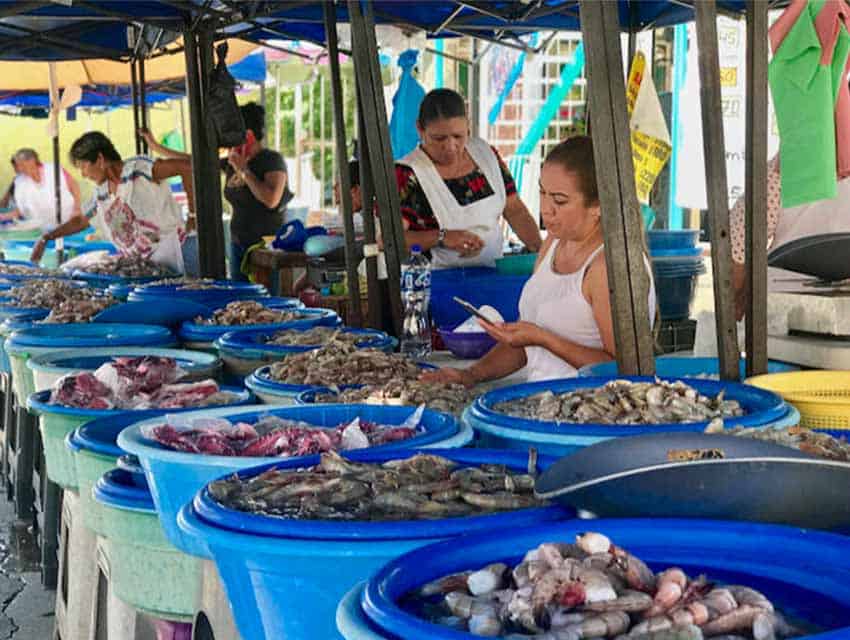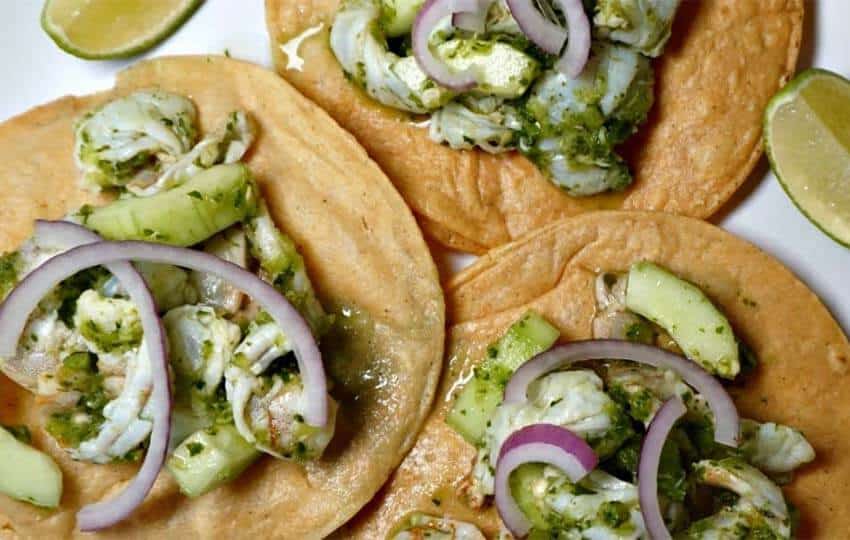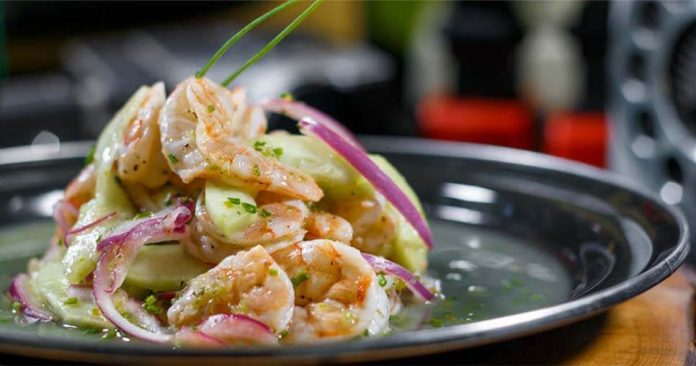I was embarrassed — really, really embarrassed — to ask a chef friend how to make aguachile.
I’ve eaten it a million times; I know it’s a simple dish with only a handful of basic ingredients: raw shrimp, fresh lime juice, chile, onion, cilantro and sometimes cucumber. Simple, yes, but iconic and Mazatlán’s claim to seafood fame, so I wanted to do it right.
I think I even blushed as I asked him if he’d come over and show me.
“Absolutely,” he said. “It’s easy. You need serrano chile. And red onion.” And so my lesson began.

Aguachile may be Mazatlán’s best-known dish, and given that the city is known as the “Shrimp Capital of the World,” that makes total sense. According to Mexico’s National Aquaculture and Fisheries Commission (Conapesca), an impressive 10,000 tonnes of wild shrimp are caught in the waters off Mazatlán each year, and even more farmed shrimp is produced.
Needless to say, shrimp is plentiful throughout town, on restaurant menus, in the mercados and from las changueras, Mazatlán’s fabled “shrimp ladies,” who sell a wide variety of camarones and other shellfish every day of the year from their outdoor stands in the historic center.
Shrimp season is basically September/October to March/April, depending on how and where the shrimp are caught. (Farmed shrimp is available year-round.)
Wild shrimp are caught with nets either close to shore by fishermen in small boats (pangas) or many miles out to sea by big commercial trawlers that flash-freeze the shrimp immediately upon catching them. That’s good news for us, because it means we can have almost-fresh shrimp all the time; I buy frozen ones in one-kilo bags to keep in the freezer at home.
Some say aguachile was first made in Mazatlán, although folks in the Sinaloa cities of Culiacán and Los Mochis might disagree. Either way, when Sinaloan cuisine is mentioned aguachile is always at the top of the list.
Originally made with chiltepines — tiny, fiery, round chiles grown regionally — contemporary recipes use the more common (and not quite as hot!) serrano chiles instead, whirred in a blender with water and lime juice to make a sort of marinade.
Aguachile can also be made with scallops (callos de hacha). And in fact the name aguachile literally means “water chile.” It’s a wonderful and refreshing dish after a hot day at the beach, or any hot day (of which there are many in Mexico!).
What were the take-aways from my cooking lesson?

Don’t leave the shrimp too long in the lime juice or they’ll get tough; so you want to time your prep according to when you want to eat.
Serrano peppers (which I rarely use) have lots more seeds, packed tightly inside the pepper skin. Cut them and the white skin surrounding them out of the skin carefully, using a small, sharp knife — and don’t touch your eyes! Scrub your hands thoroughly with soap and water after cutting or handling them.
It helps to have all your ingredients prepped before you start so you can quickly and easily move through the different steps of the recipe.
Other than that, it’s easy — just like my friend said.
Aguachile de Camarón Mazatlán Style
- 1 lb. large shrimp, peeled and deveined
- ½ cup fresh lime juice
- 3-4 Tbsp. water
- 1-3 serrano peppers, stems and seeds removed
- 1¼ tsp. salt, plus more to taste
- ¼ cup thinly sliced red onion
- 1 medium cucumber, peeled
- ¼ cup chopped cilantro
- Fresh ground black pepper, to taste
- 8 corn tostadas
- 1-2 avocados, sliced
Using a small, sharp knife, butterfly the shrimp open. If you like, cut into two pieces. (This helps the shrimp lay flat while marinating.) Rinse shrimp in cold water; pat dry with paper towels and set aside while you prep the remaining ingredients.
In a blender, place the chiles, lime juice, 3 Tbsp. of the water, half the cilantro and a teaspoon of salt. Process until the chiles are just broken up; it doesn’t need to be a smooth paste. Alternatively, using a mortar and pestle, combine chiles with a pinch of salt and pulverize thoroughly, then add lime juice and cilantro and continue to work until chiles are reduced to tiny bits.
Place shrimp in a shallow glass dish or ceramic bowl (not metal). Pour sauce over shrimp, stirring to mix well. Marinate in the refrigerator 15–20 minutes, stirring occasionally, to allow the lime juice to “cook” the shrimp. The outside of the shrimp will turn white and opaque when they are ready.
Meanwhile, cut cucumber in half lengthwise. Scrape out seeds with a spoon and discard. Cut remaining cucumber into ¼-inch thick slices or into ¼-inch cubes. Set aside.
When ready to serve, spoon shrimp and sauce onto a serving platter. Layer the cucumbers and onions over the top or around the edges, or gently stir them into the shrimp mixture.
Sprinkle with the remaining cilantro, cover and chill for 15 more minutes to blend the flavors. Garnish with black pepper and avocado slices and with tostadas or saltine crackers.
For the best flavor and texture, serve within two hours.
Janet Blaser is the author of the best-selling book, Why We Left: An Anthology of American Women Expats, featured on CNBC and MarketWatch. She has lived in Mexico since 2006. You can find her on Facebook.
